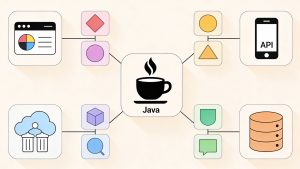The landscape of full stack development is undergoing major transformation in 2025, influenced by advances in artificial intelligence, cloud-native computing, and stronger JavaScript ecosystems. Modern developers now rely increasingly on AI-powered tools, robust cloud platforms, and collaborative design systems to build innovative applications for various industries.
Quick Snapshot: 2025 Full Stack Trends
- Artificial Intelligence-Driven Coding: Leveraging platforms like GitHub Copilot, ChatGPT, and LangChain for more intelligent and efficient code generation.
- Microservices and Serverless Solutions: Transitioning away from traditional monolithic architectures to flexible, scalable microservices models with Docker and Kubernetes.
- JavaScript Stack Dominance: MERN and MEAN stacks remain prevalent, powering both frontend and backend development across projects.
- Progressive Web Apps (PWAs): Delivering faster, offline-capable web applications using new JavaScript libraries and cloud authentication systems.
- Low-Code/No-Code Collaboration: Democratizing app development through visual platforms; enabling non-technical teams to contribute directly.
- Security-First DevSecOps: Integrating advanced security protocols throughout development lifecycles to ensure resilience and compliance.
- Smart UI/UX: Enhancing user experiences with AI scripts for automated layout, adaptive content, and predictive interfaces.
Why Indian Developers Must Stay Ahead
India’s rapidly expanding technology hubs in Pune, Mumbai, and Ahmedabad actively seek full stack developers fluent in AI solutions, cloud-native platforms, and cross-device frameworks. Startups and major enterprises are raising the bar for technical proficiency, focusing recruitment on those who can integrate AI, ensure security, and optimize across multiple platforms.
In-Depth: Leading Full Stack Trends
Artificial Intelligence in Full Stack
AI technologies are embedding themselves at every step of development:
- Tools such as GitHub Copilot automate code suggestions and bug detection.
- ChatGPT and LangChain streamline backend workflows and build conversational systems.
- Figma AI auto-generates interface components, accelerating design iteration and consistency.
This deep integration leads to faster turnaround times, higher code quality, and reduced error rates.
Cloud-Native and Serverless Architecture
The overwhelming majority of apps in 2025 are constructed upon serverless architectures leveraging AWS Lambda, Azure Functions, and managed Kubernetes environments.
- Microservices facilitate modular, scalable deployments critical for high-growth platforms such as Swiggy and Flipkart.
- Developers benefit from efficient resource allocation and simplified maintenance, ensuring business agility.
Progressive Web Apps and Cross-Platform Focus
PWAs are reshaping Indian user experiences, offering:
- Rapid load speeds and seamless offline capabilities.
- Installation options on desktop and mobile devices, improving accessibility.
Development is supported by ReactJS, Next.js, and Firebase, with best practices increasingly focused on cross-device consistency.
JavaScript Stack Evolution
Core stacks such as MERN (MongoDB, Express, React, Node) and MEAN (MongoDB, Express, Angular, Node) remain pivotal, now featuring integrated AI libraries like TensorFlow.js for advanced app intelligence.
- Companies in Pune and Mumbai prioritize developers experienced in these stacks alongside AI-enhanced tools.
Secure DevSecOps Practices
Security has evolved into a foundational requirement:
- Developers must prioritize secure API construction, automated testing (SAST/DAST), and protocol-based access control (OAuth2, JWT).
- AI tools now assist in producing secure boilerplates for authentication processes.
Low-Code and No-Code Platforms
Business teams increasingly join development workflows via platforms such as Bubble.io, OutSystems, and Uizard.
- The full stack developer’s role expands to integration, optimization, and maintenance instead of manual coding.
Career Opportunities & Insights
India’s job market for full stack developers has surged—demand rose by over 30% YoY, with AI proficiency setting candidates apart:
- Sought-after sectors include fintech, edtech, and SaaS startups in major cities.
- Salary packages are highly competitive, often exceeding ₹10L annually for experienced professionals.
Startups especially in Pune and Mumbai prioritize Node.js and AI-focused project skills, pushing developers to continuously update expertise.
Full Stack Development in 2025: Pros and Cons
Read more such articles from our Newsletter here.



